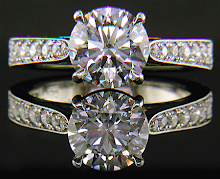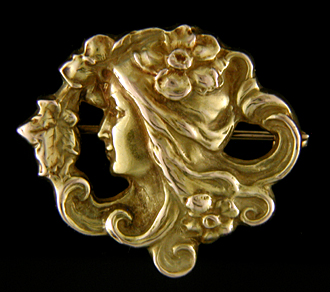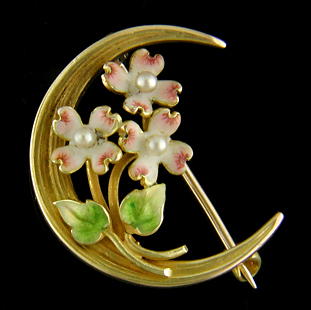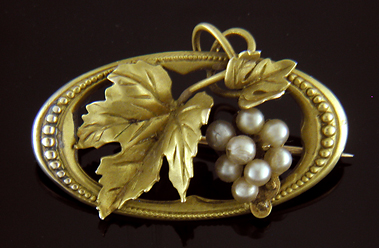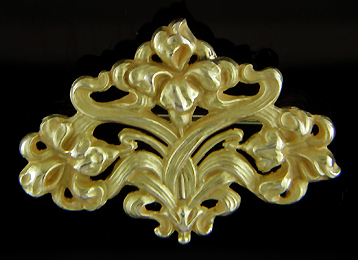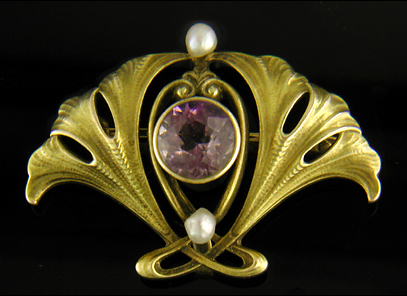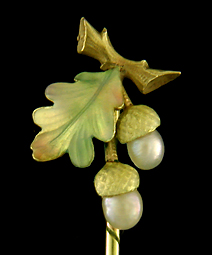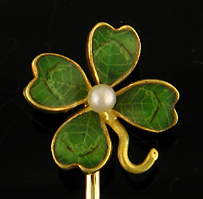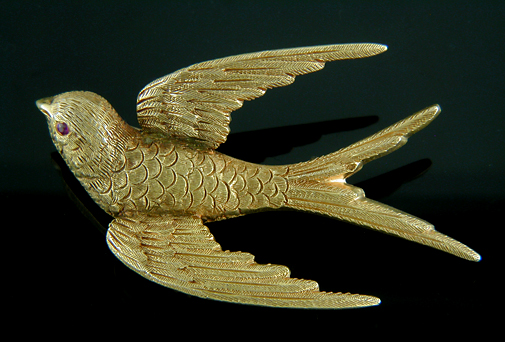Valentine's Day is a time for sweethearts and lovers to share special gifts and tokens of endearment. Cards and candies are traditional gifts. There is also a long tradition of jewels from the past being given as an expression of one's feelings in the present and hopes for the future.
The brooches and pins created 100 years ago are particularly appropriate for conveying the sentimental messages of Valentine's Day. They are laden with symbolic meanings and hidden messages favored during the late Victorian era and early 20th century. Below is a sampling of a few of our favorite brooches and stickpins from the Antique and Estate Jewelry Gallery.
So, if you are stuck on someone special or wish to brooch the subject of your intimate feelings, an antique stickpin or brooch may be the perfect Valentine's Day gift!
The brooches and pins created 100 years ago are particularly appropriate for conveying the sentimental messages of Valentine's Day. They are laden with symbolic meanings and hidden messages favored during the late Victorian era and early 20th century. Below is a sampling of a few of our favorite brooches and stickpins from the Antique and Estate Jewelry Gallery.
So, if you are stuck on someone special or wish to brooch the subject of your intimate feelings, an antique stickpin or brooch may be the perfect Valentine's Day gift!
Flora, the Goddess of Spring and Flowers, was a symbol or rebirth and new beginnings. The Goddess's golden tresses are bestrewn with a bouquet of flowers and foliage. This brooch is beautifully rendered in the Art Nouveau style. Crafted in 10kt gold, circa 1900.
The Victorians loved jewels with hidden meanings. One form were rebus jewels in which elements of the jewel represented a word or phrase. For example small brooches with delicate enamel flowers set in a crescent moon, like this one, could be interpreted as "honeymoon."The small dogwood blossoms beautifully crafted in pink and white enamel also held symbolic meaning. Among Victorians dogwood blossoms were a symbol of persistence as well as an indication of affection. Perhaps this brooch was a gift from a husband to his wife on their wedding night or at the time of their betrothal. Created by Krementz & Company in 14kt gold, circa 1900.
Beautifully detailed grape leaves and a cluster of fresh water pearls cascade across the oval frame of this Victorian brooch. In Victorian times grapes and grape leaves were a symbol of Christ, but also carried overtones of Bacchus and riotous revelry. Created by Ostby & Barton in 10kt gold, circa 1890.
A bouquet of golden irises flourishes amid an Art Nouveau tangle of curvaceous stems and foliage. Irises were a symbol of faith, hope and a promise in love. This brooch beautifully captures the wild, fluid aspect of Art Nouveau design. Crafted in 14kt gold, circa 1900.
A beautiful Art Nouveau brooch of intertwined ginkgo leaves surrounding a soft pastel Amethyst. The intricate, flowing design is accented with two small pearls. In Japan and China, Gingko trees are a traditional symbol of longevity and resilience. Created by Whiteside & Blank in 14kt gold, circa 1900.
An oak leaf and two acorns suspended from a small branch. The oak leaf is beautifully enameled with shimmering shades of green, yellow and pink. The acorns are set with two small pearls. The oak leaves and acorns are a symbol of strength and endurance, as well as a reminder that great things come from small beginnings. Crafted in 18kt and 14kt gold, circa 1900.
A beautiful four-leaf clover with richly detailed green enamel leaves. A small pearl is set in the center like a morning dew drop. This naturalistic jewel will undoubtedly bring luck to the giver, the wearer and their relationship. Crafted in 14kt gold, circa 1900.
A wonderful brooch of a swallow in flight. Among the Victorians swallows were a symbol of a loved one returning safely home. Aptly, swallows were often the first birds seen by ships returning to port. The piece is beautifully modeled with richly detailed feathers and wings and a red gemstone (possibly ruby or garnet) set as the eye. Created by Riker Bros. in 14kt gold, circa 1900.
Additional photographs and information on these and other fine estate jewels
can be found in the Antique and Estate Jewelry Gallery.
can be found in the Antique and Estate Jewelry Gallery.

